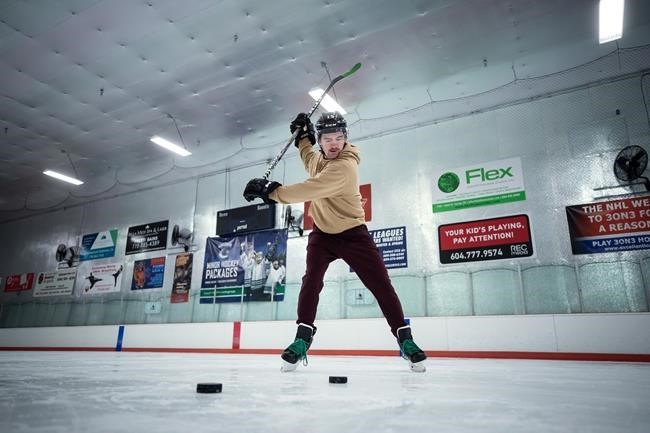SURREY, sa╣·╝╩┤½├Į ŌĆö Layne Matechuk just wants to play hockey ŌĆö and a unique piece of technology is helping him take strides toward that goal.┬Ā
It's been more than three years since Matechuk, a former defenceman for the Humboldt Broncos, suffered a serious brain injury in the tragic bus crash that killed 16 people on his team. He and his family have spent countless hours on his recovery, but some parts of his former life remain out of reach.
They're hoping an immersive neuro-rehabilitation program in Surrey, sa╣·╝╩┤½├Į, can help the 21-year-old return to the sport he loves.┬Ā
"LayneŌĆÖs goal is to be able to play rec hockey or some kind of hockey someday," said his dad, Kevin Matechuk. "Some days we donŌĆÖt think itŌĆÖs ever going to be possible and then you see him out on the ice and you see his improvements and you think ŌĆśYup, maybe heŌĆÖll be able to do what he loves the most someday.ŌĆÖ ItŌĆÖs really encouraging to us."
Matechuk and his parents recently travelled from their home in Colonsay, Sask., 70 kilometres east of Saskatoon, to sa╣·╝╩┤½├Į to work with doctors, kinesiologists and physiotherapists at the Surrey Neuroplasticity Clinic. For two and a half weeks, he's taken part in physical rehabilitation sessions both on and off the ice while wearing a device known as a portable neuromodulation stimulator, or PoNS.
ŌĆ£We place basically a stimulating plate on your tongue and that actually stimulates your brain through hidden paths to your brain," said Dr. Ryan D'Arcy, a neuroscientist with HealthTech Connex, which is working with the Matechuks. "Your tongue has nerves that go to the centre of your brain and that allows us actually to activate all sorts of neuro circuits, combine that with rehabilitation and recover lost abilities."
The technology has been used to help people living with multiple sclerosis, the effects of a stroke, ParkinsonŌĆÖs disease and post-traumatic stress disorder regain a variety of functions, D'Arcy said.┬Ā
ŌĆ£WhatŌĆÖs great about it is itŌĆÖs not a drug, itŌĆÖs not a surgery," he said. "ItŌĆÖs completely non-invasive and yet it unleashes your brainŌĆÖs potential to recover itself when you combine it with a very focused and intensive rehabilitation program.ŌĆØ┬Ā
Matechuk wore the PoNS device Thursday as he took steady, deliberate strides around the ice. A piece resembling a clunky yet modern-looking headset sat around his neck with a wire connected to a small, flat gadget in his mouth.┬Ā
Between drills, the former junior hockey player and his trainer examined grooves his skates left in the ice, taking note of how the circles became tighter and smaller as the exercise went on.
Those improvements feel good, Matechuk said.┬Ā
ŌĆ£I feel like IŌĆÖm getting back to how I used to be playing hockey," he said with a smile that showcased his braces.
Matechuk has noticed improvements in his walking, skating, speech and interactions with other people during his time in sa╣·╝╩┤½├Į His favourite part of the program, though, has been the hours spent at the rink.┬Ā
"It feels so good," he said, noting the he played hockey from the time he was three until he was 18. "So I really like getting back on the ice."
Matechuk's parents have noticed changes, too. Kevin Matechuk said his son's limp is less noticeable than when they arrived in sa╣·╝╩┤½├Į, and on the ice, he's dragging his right leg less than before.
"ItŌĆÖs little things but big things," Kevin said.┬Ā
ŌĆ£His mood is definitely in a better place. The way he walked before, it actually took a lot more energy for him to walk that way. So itŌĆÖll take him less energy to walk. ŌĆ” So the long-term effects should be huge.ŌĆØ
The Matechuks are preparing to return to Saskatchewan, where Layne will continue using the PoNS device as he completes the 12-week program his therapists have created. He'll have regular check ins to monitor his progress and provide motivation before he returns to sa╣·╝╩┤½├Į for another in-person session.┬Ā
"ItŌĆÖll really be nice to come back and look at where he started and where he is," Kevin said.┬Ā
The experience has already been indescribable for the family, he added.┬Ā
"Every parent wishes the best for their child," he said. "And with LayneŌĆÖs injury, to be able to see him continue to progress when at some points we were told he wasnŌĆÖt going to be able to do things in his life and now weŌĆÖre seeing him out doing it, itŌĆÖs really heartwarming for us.ŌĆØ┬Ā
This report by The Canadian Press was first published Nov. 19, 2021.┬Ā
Gemma Karstens-Smith, The Canadian Press


